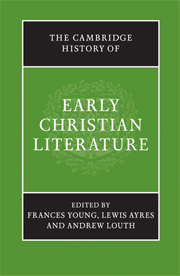Book contents
- Frontmatter
- PART ONE The Beginnings: The New Testament to Irenaeus
- PART TWO THE THIRD CENTURY
- PART THREE FOUNDATION OF A NEW CULTURE: FROM DIOCLETIAN TO CYRIL
- A LITERARY GUIDE
- B CONTEXT AND INTERPRETATION
- 37 Social and historical setting
- 38 Articulating identity
- 39 Christian teaching
- 40 Retrospect: interpretation and appropriation
- Bibliographies
- Index
- Map: The Roman Empire in the late fourth century AD"
- References
37 - Social and historical setting
from B - CONTEXT AND INTERPRETATION
Published online by Cambridge University Press: 28 March 2008
- Frontmatter
- PART ONE The Beginnings: The New Testament to Irenaeus
- PART TWO THE THIRD CENTURY
- PART THREE FOUNDATION OF A NEW CULTURE: FROM DIOCLETIAN TO CYRIL
- A LITERARY GUIDE
- B CONTEXT AND INTERPRETATION
- 37 Social and historical setting
- 38 Articulating identity
- 39 Christian teaching
- 40 Retrospect: interpretation and appropriation
- Bibliographies
- Index
- Map: The Roman Empire in the late fourth century AD"
- References
Summary
In the aftermath of the crises of the third century the Roman Empire was transformed in the time of the Emperors Diocletian (284–305) and Constantine (proclaimed emperor 306; in power over Western Empire from 312; sole emperor 324–37). The administrative structure, the society, the imperial office and the court underwent far-reaching changes under their reforms. The secular changes in the Empire could not fail to affect the life of the Christian Church. None, however, cut as deeply into its historical development as the change in its worldly status initiated by the advent of the first Christian emperor. Constantine’s victory over his rival in 312, represented as God-given, seemed to usher in a new era. Not – as is often said – because it allowed the Christian Church to grow from a minority cult into a recognized, soon to be a dominant, and eventually legally enforced, religion. It had been well on the way to respectability in the later third century; and its full legal ‘establishment’ did not come about until the end of the fourth. The significance of the ‘Constantinian revolution’ lies rather in the fact that it transformed, almost overnight, the conditions of the Church’s existence.
The main directions in the Church’s development had been established in the first three centuries of its existence. The Church entered the fourth century with a set of beliefs and an organizational structure which gave it a recognizable identity. During the last forty years of the third century it had also spread rapidly and extensively. Its membership was no longer largely confined to the lower social ranks; it was very different from the way its opponents liked to represent it: as a secretive and outlandish sect of underprivileged and uneducated outcasts. In the rare cases where some estimate of the size and composition of the Christian community is possible, its membership seems to have been a cross-section of the Roman urban classes. The Church, though certainly still a minority,was a very much larger minority than it had been in the first half of the third century, and it now embraced the whole range of Roman urban society, from the aristocracy to the urban proletariat.
- Type
- Chapter
- Information
- The Cambridge History of Early Christian Literature , pp. 397 - 413Publisher: Cambridge University PressPrint publication year: 2004

